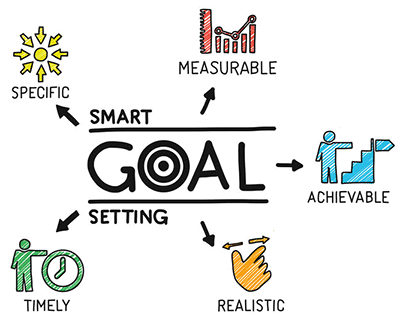How to Set Goals When Living with Depression
Goal setting is one of the most important elements of success in our professional and personal lives. Empirical research supports the idea that having clear goals can positively impact day-to-day well being, but setting realistic and achievable goals can be challenging under the best of circumstances. If you’re living with depression or anxiety, it can feel downright impossible.
But you CAN do it! We have compiled a list of simple and effective steps you can take today to start making positive progress toward your goals.
Set Small Goals
One of the biggest mistakes that people make in goal setting is trying to change their whole life in just one goal. If you have struggled to achieve goals you have set in the past, try setting a single small goal that is achievable. You can then use that win to start strong on the next small, actionable goal.
This strategy of starting small works for goals large and small. An example of starting small for a large goal could look something like:
I want to lose 100 pounds, so my goal today is to replace my afternoon potato chips with a piece of fruit.
Thinking about losing 100 pounds is a lofty and worthwhile goal, but can feel overwhelming so try not to set this as the focus. Instead, focus on making healthier choices that have a snowball effect and help you build momentum. Once you have created a habit of replacing your afternoon potato chips with a piece of fruit, you may start seeing some positive health effects such as a few pounds lost or increased energy. This is an ideal time to set your next small, achievable goal.
I will walk 10 minutes daily.
Setting and accomplishing small and achievable goals (goal stacking) has a positive effect on your motivation and help you begin to internalize that you can accomplish the larger goal. This is especially important for people struggling with depression or anxiety because progress can come from small steps and consistency.
Focus On Self-Care
Self-care activities, such as getting enough sleep, eating a healthy diet, and exercising regularly, can be helpful goals when living with depression. These goals can help to improve your overall well-being and may also help to reduce your symptoms.
Self-care activities, such as getting enough sleep, eating a healthy diet, and exercising regularly, can help to reduce the severity of depression symptoms. Taking care of yourself can help you to build resilience and better cope with the challenges of living with depression.
Make Your Goals Specific

One of the most common mistakes in goal setting is failing to be specific. If you do not know exactly what your goal is, how will you know if you’ve achieved it?
Common examples of non-specific goals might sound like:
- I want to be happier
- I am going to get healthy this year
- I am going to lose weight this year
- I am going to spend more time with family
All of these aforementioned goals lack specificity. How will you measure happiness? Happiness is hard to quantify and if you’re living with anxiety or depression you may struggle to even visualize what your happiness might look like.
Health goals can be quantified if you have a specific goal, such as reducing your cholesterol by a specific number, eliminating a particular food – such as soda – from your diet, or by incorporating a certain amount of exercise into your daily routine.
Spending more time with family is a wonderful idea, but a non-specific goal. Try reframing the idea into a specific goal such as, “Every Sunday we will put away our phones for one hour and play a family board game.”
Use SMART Goals
One of the most important things to do goal-setting when depressed is to use the SMART approach to goal-setting. SMART goals have a clear objective, a timeline, and a measurable outcome.
- Specific – Who, what, when, where, why, or which
- Measurable – How much / how many?
- Actionable – Is this achievable? Goals should be challenging but achievable
- Realistic – Is this goal realistic?
- Timely – Does your goal set a deadline?
S.M.A.R.T. Goal Examples
For example, if you want to lose weight, your goal might look something like this:
I will lose 3 pounds (Specific and Measurable) by incorporating daily walks of at least 30 minutes (Actionable) by October 1st (Realistic and Timely).
If you want to save money and your old non-SMART goal was, “I want to save money this year”, try reframing into something such as:
I will save $1000 this year (Specific, Measurable, and Timely) by making my coffee at home each morning instead of going to Starbucks (Actionable/Achievable and Realistic).
Examples Of SMART Goals You Can Try
- Wake up by 8am each morning. Provides a routine to your day.
- Brush teeth and shower before 9am. Ensures you maintain personal hygiene.
- Prepare and eat a balanced breakfast by 10am. Sets you up with good nutrition for the day.
- Drink at least 8 glasses of water throughout the day: Helps to maintain hydration and wellbeing.
- Take prescribed medication at the same time every day. Ensures you’re consistent with your treatment.
- Spend at least 30 minutes outside by noon. Exposure to sunlight and fresh air can be beneficial and getting exposure to bright light in the morning can help you sleep at night because it sets your circadian clock.
- Practice 10 minutes of mindfulness or meditation in the morning. Helps manage stress and promotes mental clarity.
- Write at least 200 words in a journal before bedtime. Aids in emotional expression and reflection.
- Complete one small chore by 2pm. Gives a sense of accomplishment and maintains your environment.
- Practice 5 minutes of deep breathing or progressive muscle relaxation when feeling anxious. Aids in calming down during stressful moments.
- Walk for at least 15 minutes after dinner. Regular light exercise can improve mood.
- If applicable, spend 15 minutes playing with a pet in the afternoon. Pet interaction can offer emotional comfort.
- Send a text or make a phone call to a friend or loved one by 5pm. Helps to maintain social connections.
- Read 10 pages of a book or listen to a 20-minute podcast after dinner. Provides mental stimulation and relaxation.
- Listen to 15 minutes of calming music before bedtime. Helps create a calm atmosphere conducive to sleep.
- Limit caffeine intake to before noon and avoid alcohol. Better control of substances that can impact mood and sleep.
- Aim to be in bed by 10pm and wake up at the same time each morning. Ensures consistent, healthy sleep patterns.
- Write down one thing you’re grateful for each evening. Cultivates a positive mindset.
- Limit screen time to under 2 hours per day. Reduces potential for overstimulation and helps improve sleep.
- Dedicate 30 minutes to self-care each evening, like a bath or a hobby. Regular self-care can improve your mood and overall well-being.
Share Your Goals With Your Support Network
Let the people who love and support you know about your goals. They can help you stay on track, celebrate your wins, and keep you grounded if you stumble. Sharing your dreams and desires is also a great way to stay connected, build confidence, and create strong bonds that will help you navigate your depression.
It can be helpful to have an “accountabili-buddy.” This is someone who will check in with you daily to see how you are doing with your goals and cheer you on. Goal setting can be hard, but having a cheerleader on your team helps!
Be Kind To Yourself
Depression can wreak havoc on your self-esteem and promote negative self-talk. This can be a huge obstacle to successful goal setting if you’re telling yourself things like “I probably can’t do it anyways, why even bother?”
It’s important to remember to be kind to yourself and practice self-compassion.
Goal setting is a process, and all processes involve successes and failures. If you miss your goal, it’s okay! Take a breath, evaluate what happened and what you can do tomorrow to get back on track.
Focus on Gratitude
One of the biggest ways to stay positive and achieve your goals is to focus on gratitude. Try to find something to be grateful for that is directly related to your goal. To use our earlier example of setting a small goal of swapping your chips for a piece of fruit, you can find gratitude with thoughts like:
“I’m grateful that I have access to fresh produce in my neighborhood.”
Practicing gratitude will help you feel positive about your goals and is one of the most effective ways to replace negative self talk.
Help Is Available!
If you’re living with depression and want to accomplish your goals, you don’t have to do it alone. Seeking out treatment and therapy is a powerful first step towards setting successful goals when living with depression.
Novum Psychiatry serves Sudbury, Plainville, and Surrounding Communities. We Accept Health Insurance. Our highly-trained psychiatrists and therapists offer a comprehensive and confidential approach to private, outpatient psychiatric care. Whether this is your first time seeking psychiatric care or if you are seeking a new provider, Novum Psychiatry can help.





